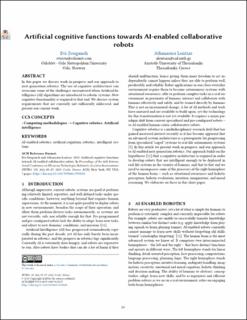| dc.contributor.author | Zouganeli, Evi | |
| dc.contributor.author | Lentzas, Athanasios | |
| dc.date.accessioned | 2023-09-18T06:31:42Z | |
| dc.date.available | 2023-09-18T06:31:42Z | |
| dc.date.created | 2023-09-16T14:11:28Z | |
| dc.date.issued | 2023 | |
| dc.identifier.isbn | 979-8-4007-0069-9 | |
| dc.identifier.uri | https://hdl.handle.net/11250/3089961 | |
| dc.description.abstract | In this paper we discuss work in progress and our approach to
next generation robotics. The use of cognitive architectures can
overcome some of the challenges encountered when Artificial In-
telligence (AI) algorithms are introduced to robotic systems. New
cognitive functionality is required to that end. We discuss system
requirements that are currently not sufficiently addressed, and
present our current work. | en_US |
| dc.language.iso | eng | en_US |
| dc.relation.ispartof | PETRA '23: Proceedings of the 16th International Conference on PErvasive Technologies Related to Assistive Environments | |
| dc.rights | Navngivelse 4.0 Internasjonal | * |
| dc.rights.uri | http://creativecommons.org/licenses/by/4.0/deed.no | * |
| dc.title | Artificial cognitive functions towards AI-enabled collaborative robots | en_US |
| dc.type | Chapter | en_US |
| dc.type | Conference object | en_US |
| dc.description.version | acceptedVersion | en_US |
| cristin.ispublished | true | |
| cristin.fulltext | postprint | |
| cristin.qualitycode | 1 | |
| dc.identifier.cristin | 2175747 | |
| dc.source.pagenumber | 14-16 | en_US |

